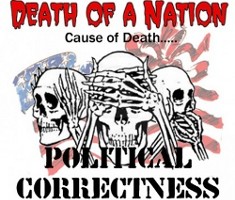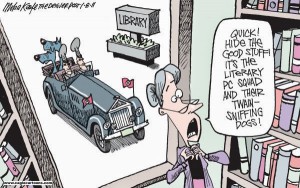I belong to a lively online Historical Novels discussion group in which authors engage in lots of discussions ranging from how one researches historical novels to selecting book titles. Recently someone started a discussion about whether or not we authors should be politically correct when writing historical fiction. The result was a long thread of comments from authors of historical fiction.
Almost to a person, authors of historical novels say political correctness should NEVER influence how we write about the past. To do so is to be disingenuous to those who read our books.
Our job as authors of historical fiction is NOT to “clean up” or rewrite history so the sins of the past are erased from our consciousness. The fact is, overt racism, religious oppression, and other forms of discrimination have been part of life for several thousand years. They still are.
You can see how political correctness has distorted the literary landscape when writers of historical fiction attempt to cleanse offensive language in their books that once was used to describe certain races, classes, religions, and ethnic groups.
As one group member said: “Let’s not only get political correctness out of historical fiction but also let’s get it out of society. If you wrote a Civil War story and had a character refer to a black person as an African-American, you ought to be horsewhipped.”
Let me say it forthrightly and plainly: political correctness has no place in historical fiction. If you are striving to create accurate characters and events in a novel about the past, you must create characters that think, speak, and act the way they did during the period in which the story is set–verbal warts and all.
To inflict political correctness on literary art is to censor and suppress creativity. P.C. has already overrun and dampened free speech and innovative thought in our schools and on college campuses. God forbid that the thought police should be successful in invading the province of historical fiction too!
The P.C. thought police already have been successful in getting books like Huckleberry Finn and Tom Sawyer by Mark Twain, Uncle Tom’s Cabin by Harriet Beecher Stowe, and To Kill a Mockingbird by Harper Lee removed from some school libraries because of their use of language and racial characterizations prevalent in 19th and early 20th Century America. They have even convinced a few publishers to issue “cleansed” versions of Mark Twain’s work with some passages and descriptions rewritten and some offensive words removed.
Taking this a step further, I think one of the most egregious phrases that the P.C. Gestapo has inflicted on our society is: “hate speech.” Even the ACLU, that great liberal bastion, says there is “NO SUCH THING AS HATE SPEECH. THERE IS ONLY FREE SPEECH.”
The way to deal with so-called “hate speech” is to have more free speech, the ACLU says–not to shut down speech that YOU may think is offensive.
When we begin to label speech that may be offensive to a particular group as “hate speech,” it has a widespread chilling effect on all of us. I saw classes being taught at the university where I was a dean that discussed the issue of racial prejudice without using the epithets and pejoratives commonly employed in the past to describe black people, Hispanics, and other minorities. This is just silly. The only words allowed in class were the defamatory ones used to describe immigrants from Ireland, Italy, Poland, France, Germany, etc.
I assume it is OK to use words like mick, honkie, Ginnie, kraut, pollack, frog, etc., because those people are white. But you may not use words like nigger, beaner, chink, raghead, slope head, etc., in a history class about racial relations because saying them, even in an educational setting, may offend someone.
That’s like teaching music but banning specific notes the music teacher doesn’t like being played. How would Mozart sound if double flat notes or tuplets were not allowed to be played?
A couple of years ago, the University of Chicago took a bold step against political correctness when it sent a letter to the incoming freshman class of 2020 that said the university would battle against political correctness and create a more open campus environment that encouraged freedom of ALL expression.
To quote the letter: “Our commitment to academic freedom means that we do not support so-called ‘trigger warnings,’ we do not cancel invited speakers because their topics might prove controversial, and we do not condone the creation of intellectual ‘safe spaces where individuals can retreat from ideas and perspectives at odds with their own.” Dean of Students John Ellison signed the letter. Good for him!
Professors who impose P.C. on students in the classroom are shortchanging their education by eliminating viewpoints they don’t like. Sadly, I saw this pattern of behavior too often when I was a university Dean and professor. I will not abide it in my writing, nor should authors who seek honesty in their work. This is where all of this P.C. nonsense has led us: to a disingenuous, hypocritical America where truth is suppressed in favor of mandated diversity and inclusiveness.

There is nothing wrong with promoting a more diverse and inclusive nation–but I think this country, despite its less than stellar racial history, has done a pretty good job of creating a nation of people who get along pretty well. There will always be anomalies, there will always be racism, and there will always be people who hate others who are different from them, but I think the United States is doing OK.
As writers of historical fiction, it is incumbent upon us to be truthful in our depictions of times past–even those ugly times.
For the P.C. thought police and the incurably “woke,” it is not only the politically incorrect word or name that is the problem. It is a person’s attitude, an individual’s mindset, and their ability to think freely and express themselves in a particular way that the P.C. bullies and woke mob want to control. If an individual’s opinions do not conform to THEIR Weltanschauung, those opposing views should not be expressed. This is intolerance in the extreme.
The P.C. police believe everybody should think precisely as they do. Does that remind you of Nazi Germany, the USSR under Stalin, China under Mao, or North Korea today? It should because by suppressing and controlling how people think and express themselves, the P.C. thought police and the woke mob are destroying the intellectual diversity that engenders creative thought.
To paraphrase another author in one of our Historical Novel Society discussions: “We in the U.S.A. are now in our own oppression era, quite similar to Hitler’s Germany, Stalin’s USSR, or Mao’s P.R.C., where you can lose your job, your promotion, your chance at tenure, or even an opportunity to get a job, because of a ‘traditional belief,’ or a belief that doesn’t toe the line of the P.C. thugs currently in charge of the media and ‘special’ interest groups. Let there be no mistake, the oppression is real, and it’s not just about what we write or our hopes/goals of being published and selling our work (which is, after all, an extension of ourselves in part); it’s about what we are ALLOWED to say or write, either by the ‘guardians of P.C.’ or government.”
The underlying question is this: are we really ‘free’ in what we choose to write and say? Do we indeed still have freedom of speech as guaranteed by the First Amendment, or do we now SELF-CENSOR because we are afraid of ‘the backlash’?
For those who write or who create other forms of art, these are critical questions that need to be considered. I, for one, will not be bullied by the P.C. thought police or the woke horde in my historical novels.
Politically correct speech and its offshoots of intolerance, censorship, and social intimidation are the greatest dangers to free speech since the First Amendment was inserted into our Constitution in 1791. If the P.C. thought police manage to eviscerate that critical component of our Bill of Rights, freedom of speech will cease to exist.
Today that vital right is hanging by a thread.


